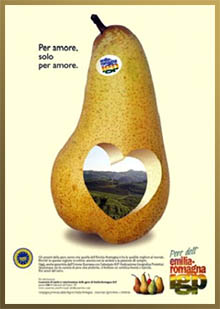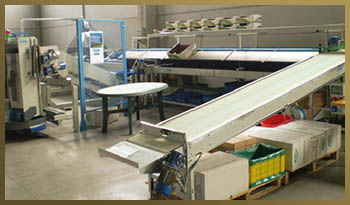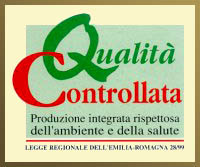



Food Quality and Safety
What is meant by quality? Quality is “the ability of a set of characteristics inherent to a product,
system or process to comply with the requests of customers and other interested parties". This is the
reason for all the talk about focusing on the customer.

In today’s market there is an increasingly pressing request for high quality services. For this reason
the commitment of companies to guarantee quality, efficacy and efficiency of products/services
provided is a necessary element, not to be ignored.
Improving quality is geared towards pursuing an improvement both in the relationship with the client
and in the internal organizational processes.
Besides these external motivations, it must also be highlighted that various companies seek
improvements inside the company, which is the best benefit to be obtained by a certified quality
system.
GlobalGAP Certification (former EurepGAP)
It is a voluntary product certification scheme for any type of producer, individual or part of a group
(cooperative), operating in the sector of production of fresh agricultural products for human
consumption. The certification regards fruit and vegetable products obtained through application of
integrated and sustainable cultivation techniques, or GAP, Good Agricultural Practices. These
techniques are defined by the Global GAP Control Points and Compliance Criteria.
The Control Points are divided in "scopes" specifying the most general principles in common of all the
companies of the agro-alimentary line of both the agricultural division and the fish farming/animal
breeding one. They are further divided into "sub-scopes" clarifying the most specific requisites
characterizing Fruit and Vegetable production.
GlobalGAP is a certification scheme applied at the International level. It was developed in 1999 by
the GDO (Large-scale retail trade), originating as EUREPGAP, then changing its name and structure
under the latest revision, number 3 in March 2007.
The purpose of this scheme is to allow large-scale retail trade to purchase fruit and vegetable
productions obtained with preset, controlled and certified cultivation methods in order to put them on
the market offering the consumer guarantees of quality, food safety, and documented traceability.
Our studio provides the necessary consulting to walk you through the GlobalGAP certification even with
financing from Catalogo Verde.
BRC IFS Certification
Today certification according to BRC (British Retail Consortium) and IFS (International Food Standard)
is a fundamental requisite required by many European retail distribution chains and regards the
processors of agricultural products. Developed by the BRC and by the BDH (Federal Union of German
Commerce Associations), the Standards are created to ascertain the conformity of suppliers regarding
food legality and safety requirements.

The main requirements of the standards regard the adoption of an HACCP (Hazard Analysis and Critical
Control Points) system, the implementation of a documented quality system and the control of products,
processes, employees and the environmental conditions of the processing facilities. These standards
are currently recognized by the majority of the English, German, and French retail chains, and by an
increasing number of European distribution chains.
Traceability
Product line traceability certification responds to a precise need of reassuring the consumer in
today’s globalized market in which distances between producers and consumers is ever-increasing.

Traceability, which allows for tracing a product back to its origins and determining all the steps and
activities tied to the various stages of processing and distribution of the same product, constitutes
a guarantee for the client/consumer in that it formally determines the responsibility of all the
subjects who have contributed to obtaining the food product, with no exclusions.
HACCP
HACCP (Hazard Analysis and Critical Control Points) is a system of self-control that every food
production sector operator must put into practice in order to assess and estimate dangers and risks as
well as establish control measures to prevent hygienic and health problems from arising.
The HACCP system originates from the requirement of guaranteeing the healthiness of food preparations.
Prior to the adoption of the HACCP system, controls were carried out at the end of the production
process, with an analysis of the finished product alone, ready for sale to the consumer. The self-control
system instead aims at evaluating risks that can threaten food safety at every phase of production,
putting preventive measures into effect.
This checking system is determined to monitor the whole production and distribution process of the
food, with the aim of determining some critical phase(s) of the process, or critical control points,
which must be constantly monitored.
The system was thought up in the United States in the 1960’s with
the objective of ensuring that food products supplied to NASA astronauts would have
no negative effects on their health putting space missions at risk.
HACCP was first introduced in Europe in 1993 with the 43/93/CEE
directive (adopted in Italy as the 26 May 1997 legislative decree,
no. 155), which foresaw the obligation of applying the HACCP protocol for all operators at any and
every level of the food production chain. This regulation was substituted in 2006
with regulation 852/2004.
Likewise in 2006 the HACCP system became mandatory even for companies involved in the
production of animal feed for animals destined for food production (production of the raw materials,
mixes, additives; sales; administration).
The HACCP system is based on the application of seven principles:
- Conduct a hazards and risk analysis.
- Determine the Critical Control Points (CCPs).
- Establish critical limits.
- Establish monitoring procedures.
- Establish corrective actions.
- Establish verification procedures.
- Establish recordkeeping and documentation procedures.
My articles and publications
Download area
- Guidelines for traceability of food products.
- GlobalGAP – Sicurezza Integrata in Agricoltura
- IFS Standards Version 6
- BRC Standards version 6 - Article Calabria Chamber of Commerce
- Professional Agronomists and Foresters - From the field to the table
Links
Designed by MB Network srl © 2009-2022